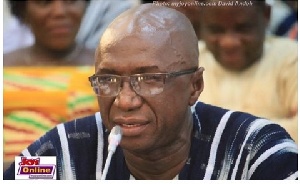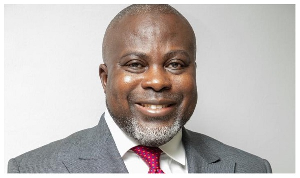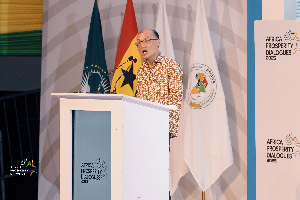The Interior Minister-designate, Ambrose Dery, has revealed that he would use existing laws in handling all internal national security issues.
He gave the assurance that issues ranging from post-election hooliganism, extortion of monies from road users and harassment by some security agents would all be stopped to ensure general internal national security.
“I would be doing the work purely by the rule of law and as long as they are doing the wrong thing, those acts would be stopped,” he said.
Appearing before the Appointments Committee of Parliament for vetting, the incoming Interior Minister demanded professionalism from the security agencies and cautioned those who put impediments in the way of businesses that the law would not spare any miscreant security official.
The Minister-designate, described as a devout Catholic, and Member of Parliament (MP) for the Nandom Constituency in the Upper West Region, was reacting to issues on vandalism of state properties after elections and reported cases of unacceptable behaviour by some security agents.
Mahama Ayariga, MP for Bawku Central, and a member of the Committee, made reference to complaints by his constituents who import onion, yam and livestock to Accra about frustrations they face on their journey as policemen extort money and mount road blocks.
Mr Ayariga told the Committee that some of their products rot and the livestock die because they refuse to pay monies to the security agencies.
He said: “They said I should ask the Interior Minister whether he would stop the practice of police officers erecting barriers indiscriminately from Bawku up to Accra, stopping haulage trucks and extorting monies from them.”
Mr Dery gave the assurance that the Nana Akufo-Addo administration would create the enabling environment for the private sector actors.
He said vigilante groups must be delinked from partisan considerations and individuals must take responsibility for their actions.
“For me…I must be convinced that those groups are responsible for these activities. I have also said there is no vicarious liability for criminal offences. I am not aware that it is political party vigilantes that are doing so,” he said.
Mr Dery insisted that the reported incidents of vigilante action must be handled on an individual basis as against an outright disbandment.
“All must be condemned and not be countenanced, however, handling of each complaint must be professionally pursued in that, if you are a suspect, investigations conducted, rights are respected and people who deserve to be prosecuted will be prosecuted,” he said.
Mr Derry said: “Article 41 of the Constitution gives citizens the obligation to cooperate with security agencies and it also gives citizens the duties to protect public property and what have you. Indeed, when it comes to the misuse of funds it even uses combat.”
On the engagement of private security, Mr Dery said the government would follow existing laws preserved in the 1992 Constitution.
He said much as the nation would use private security when necessary, it would not abdicate the role to provide that cover to the police and other security agencies which also provide an opportunity to raise funds.
He said: “For example, we have the Formed Police Unit in South Sudan in the Police. Ghana has sent one team and the United Nations were impressed about it and they want two more teams. Should we get two more teams there, we will earn some hard currency that will not only support the economy but help finance the various institutions.”
He assured the security agencies that improvement in accommodation for the services would be one of his priorities, adding that the introduction of the National Barracks Regeneration Programme would help in the housing programme of the agencies.
“We have stated in our manifesto that there will be a National Barracks Regeneration Programme and a public-private partnership (PPP) arrangement is one of the options.
“The investment could come through the PPP arrangements but we will do that with the consciousness of value for money and ensure that the country gets the best deal when it comes to this,” he said.
“We have public-private agreements and engagements in the prisons for instance. There are engagements between the Prisons Service and some private sector actors…and so I believe that there will be some internally generated funds that will come in and I have confidence that this government will get the resources to make good the promises that we made to Ghanaians,” Mr Dery said.
General News of Monday, 23 January 2017
Source: dailyguideafrica.com

















